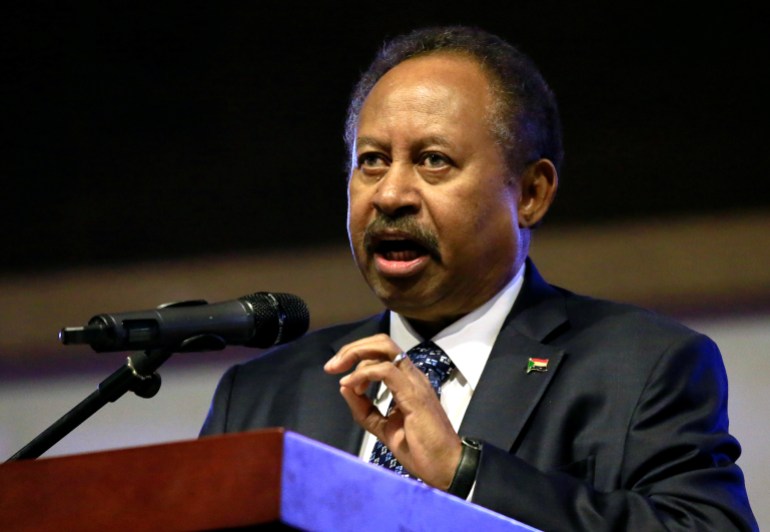On February 10, Sudan’s largest antiwar coalition, Taqaddum, finally splintered.
One of the belligerent parties in Sudan’s nearly two-year conflict was deciding whether to join a new parallel government being established by the paramilitary Rapid Support Forces (RSF).
The Taqaddum coalition, which was founded in October 2023, was led by Abdalla Hamdok, the former prime minister who was overthrown by Sudan’s army and the RSF in 2021. It was made up of armed movements, political parties, and civil society activists.
Now, Taqaddum has split into two.
The parallel administration of the RSF now has the name Taasis (Foundation). They are mostly armed movements, analysts told Al Jazeera, who wagered on turning their weapons into leadership roles in the new RSF government.
“Armed groups don’t have a constituency, so they rely on a big, armed actor]like the RSF] as a guarantor for a political seat”, said Kholood Khair, founding director of the Confluence Advisory think tank.
Traditional political leaders, including Hamdok, who chose not to join the RSF formed a smaller antiwar coalition called Somoud (Resilience), trying to preserve their neutrality and reputations, she said.
“Political parties don’t need]a guarantor] and it would be political suicide for them to form a government with the RSF… they don’t want to be seen as forming a government with genociders”, she added, referring to the United States ‘ determination that the RSF committed genocide in Sudan’s Darfur region.
Tainted label
Following a disagreement over how and when to integrate the former into the latter, Taqaddum was originally an antiwar coalition putting an end to the conflict that had erupted between the RSF and the army in April 2023.
Tens of thousands of people have been killed in armed conflict, famine has been declared in several regions, and about 12 million people have been forced from their homes, making this the most severe humanitarian crisis by far.
Many of Taqaddum’s civilian politicians were already struggling to find relevance because they were viewed as being too close to the RSF during mediation talks, which were purportedly intended to end the war and resume the 2021 coup’s transition to democratic rule.
In January 2024, Taqaddum’s reputation suffered a much worse blow as a result of its signing of a Declaration of Principles (DoP) with the RSF.
According to the DoP, the organization allegedly sought to reinstitute basic laws of war and ensure that there were no RSF-controlled areas for service.
But the deal came days after the RSF captured Wad Madani, capital of Sudan’s breadbasket Gezira state, where it committed atrocities including rape, looting and extrajudicial killings, according to local monitors.
Many people thought Taqaddum was siding with RSF abuses by signing the DoP at the time.
According to Alan Boswell, an expert on Sudan for the International Crisis Group, many Western diplomats were “growing concern that parts of Taqaddum were RSF-aligned” as a result of the agreement.
Hamid Khalafallah, a Sudan policy analyst and a PhD candidate at the University of Manchester, agreed that the signing exacerbated Taqaddum’s legitimacy crisis.
According to Khalafallah, “there was a problem where Taqaddum cosyed up with the RSF or was slightly more in line with the RSF because the army was quite hostile to peace talks” and Khalafallah said.

New start?
According to analysts, the splinter may be a “blessing in disguise,” because it allows Somoud members to distance themselves from the RSF, “reinvent themselves,” and improve communication with Sudanese civilians.
Boswell predicts the West will “wait and see” before deciding whether to accept Somoud as a neutral actor because he believes that the coalition is now noticeably smaller and less contaminated than Taqaddum.
He also thinks Somoud might be a part of a larger civilian unity government, where the majority of government officials align with one of the two parties seeking to end the conflict through a power-sharing deal.
Khalafallah urged Somoud to promote its rhetoric against the realities of Sudanese civilians on the ground and to engage with local organizations and activist groups more frequently.
According to Khalafallah, “they can acknowledge that people have better experiences when the army] recaptures territory and that there is support for the army,” Khalafallah said, underscoring that Somoud could maintain its neutrality as such acknowledgment would not conflict with their request for the army and RSF to put an immediate end to this conflict.
Bakry Elmedni, a spokesperson for Somoud and an associate professor at Long Island University’s School of Business, Public Administration, and Information Sciences, claims that the antiwar coalition was targeted by army-backed smear campaigns against the antiwar coalition.
He claims that the army “sympathizes or supports” RSF and was invited to the signing but declined to attend. He instead uses the DoP to portray Taqaddum as a coalition that “sympathizes or supports” the DoP.
“We knew from day one the accusations]against Taqaddum] were part of a political campaign… Everyone knew they were lies”, he told Al Jazeera.
“However, it did affect the impression of Taqaddum, but to tell you frankly, I don’t believe there was any evidence to suggest Taqaddum was supporting the RSF”.

Many civilians in the nation despise the RSF and applaud the army’s capture of territory, claiming that it provides some form of stability.
However, it has been claimed that the army carried out numerous reprisals killings against alleged RSF sympathisers. Human rights organizations, UN monitors, and activists on the ground claim that tactics frequently cross ethnic lines or are directed at activists and local relief workers.
Source: Aljazeera





Leave a Reply